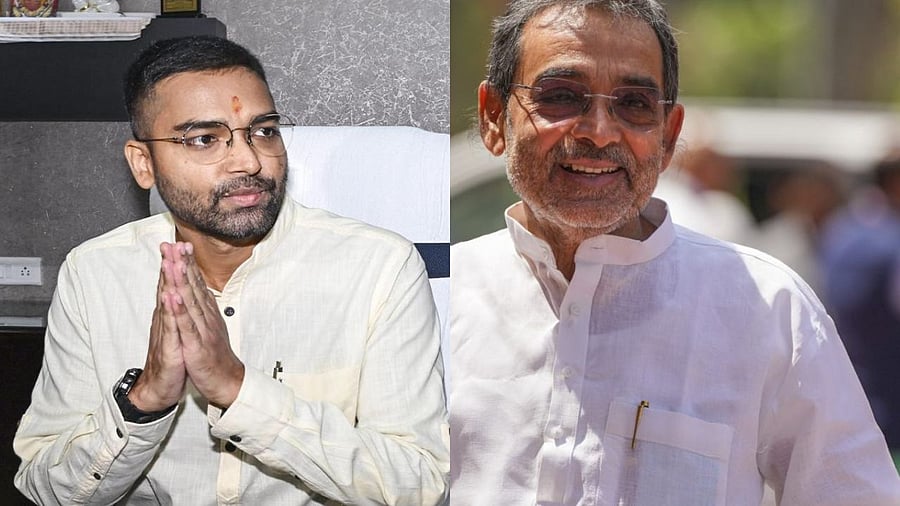
Deepak Kushwaha (left) and Upendra Kushwaha
Credit: PTI Photo
Upendra Kushwaha chose his unelected son Deepak Prakash as Rashtriya Lok Morcha’s (RLM) choice for Nitish Kumar’s cabinet on November 20, inviting criticism for not choosing any of the four winners from his party that included his wife Snehalata.
A day later, Kushwaha wrote a post on ‘X’ defending himself, saying he knew fully well that his decision would be categorised as dynastic politics but his hands were tied owing to his eagerness not to repeat the “past mistakes” and to “save and sustain” his party, which he founded after falling foul with Nitish.
Kushwaha’s predicament is nothing new thing in Indian politics and it ran in various parties that started off with noble ideals but now firmly entrenched in dynastic politics – from RJD to Samajwadi Party, DMK, Shiv Sena, NCP, TDP, BRS, YSR Congress, National Conference, PDP, Congress and many more.
Kushwaha said he prioritised his determination to keep his party “alive and intact” and that was why he took the decision, which he called akin to drinking poison. Without providing details, he recalled how his people won and walked away.
“The bag remained empty. We came down to zero. It was important to think in order to prevent such a situation from occurring again,” he reasoned. He said if this decision was not taken, they would have gone back to zero and do not know what is in store for the future.
A senior Jharkhand Congress leader told DH, “one may criticise dynastic politics but people love political dynasties. That is why so many are successful. Congress denied seats to some of the dynasties in Bihar and saw the result. We can keep talking about it but that is the reality.”
Another leader referred to the examples of JD(U)’s Nitish Kumar and JMM’s Hemant Soren when they chose outsiders to warm their chairs when they were out while trying to see reason in Kushwaha’s move. Both Jiten Ram Manjhi and Champai Soren triggered trouble when their masters wanted the chairs back.
However, it appeared that AAP’s Arvind Kejriwal learnt from their experience and chose not to leave the chair when he was jailed while making his wife his political voice. Only when he was out and knew he could control the course, he chose a replacement in Atishi.
In Samajwadi Party, Akhilesh Yadav rebelled against his father Mulayam Singh Yadav and his uncle Shivpal Yadav but the father-son duo patched up to sideline the latter. Bal Thackeray also chose his son Uddhav to succeed him in Shiv Sena against his nephew Raj.
If one cannot see beyond the Gandhis in Congress, DMK saw M Karunanidhi grooming his son MK Stalin, who now wants to hand over the baton to his son Udayanidhi. In TDP, N Chandrababu Naidu, who took over the party from his charismatic uncle NT Rama Rao, has ensured that his son Nara Lokesh is entrenched in the party apparatus.
Generally, dynastic politics is a son’s playground but in NCP (SP), Sharad Pawar’s daughter Supriya Sule is in charge after his nephew Ajit Pawar split.
But that was not the case for K Kavitha in BRS where K Chandrasekhar Rao is inclined to his son KT Rama Rao and in YSR Congress, YS Jaganmohan Reddy has full control while his sister YS Sharmila has returned to the Congress. In RJD, Lalu Prasad has chosen his younger son Tejashwi as his heir while ignoring his daughters.
Parkash Singh Badal entrusted the party with his son Sukhbir Singh Badal while the latter’s cousin Manpreet Badal, considered a promising leader in Akali Dal, had to party hop and finally settle in the BJP.
